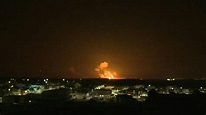Featured
article
- Get link
- X
- Other Apps
Pentagon Clarifies Intent Behind Iran Strikes Amid Rising Tensions

In a high-stakes moment for Middle East stability, U.S. Defense Secretary Pete Hegseth emphasized that recent American military strikes on Iranian nuclear facilities were not intended to trigger regime change. Speaking from the Pentagon, Hegseth stated the operation was a precision mission aimed at neutralizing threats posed by Iran’s nuclear program, not a broader political upheaval.
The operation, dubbed Operation Midnight, involved a formidable show of force: 14 bunker-buster bombs, over two dozen Tomahawk missiles, and more than 125 military aircraft. Initial assessments suggest severe damage to all three targeted sites.
Despite the scale of the attack, the U.S. has reportedly sent private messages to Tehran encouraging diplomatic engagement. Meanwhile, Iran has retaliated with missile strikes on Israel, injuring civilians and damaging infrastructure in Tel Aviv. However, it has so far held back from directly targeting U.S. forces or disrupting oil shipments through the Strait of Hormuz—a move that could escalate the conflict dramatically.
General Dan Caine confirmed that U.S. forces in the region remain on high alert, prepared to respond to any further Iranian retaliation or proxy attacks.
This development adds another layer of volatility to a region already strained by prolonged conflicts in Gaza, Lebanon, and Syria.
Popular Posts
Midnight Blast Shakes Gaza Skyline Amid Rising Tensions
- Get link
- X
- Other Apps
Trump's Six Words: "I'm Going to Stop the Wars"
- Get link
- X
- Other Apps



Comments
Post a Comment